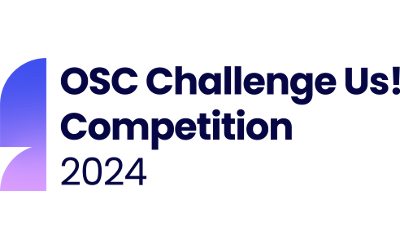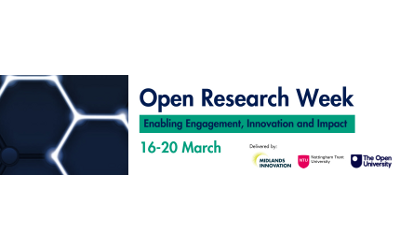OU research challenged to collaborate to drive sustainable change

UK charities and Milton Keynes businesses have challenged The Open University (OU) to collaborate with them to solve some of society’s most pressing issues.
Earlier this year, the OU opened a competition for businesses in Milton Keynes and UK charities to submit research-based challenges to its Open Societal Challenges Programme addressing the themes of Living Well, Sustainability and Living Tackling Inequalities.
Recipients of funding were awarded at the OU’s biannual research showcase on Thursday 12 September 2024.
The winning Milton Keynes businesses’ entries are:
A proposal for a Dementia-friendly city for all
By Iain Stevenson from Milton Keynes Development Partnership working with OU academic, Dr Hannah Marston
This challenge’s overall objective is to transform Milton Keynes (MK) into a more dementia friendly city, founded in evidence-based research. MK aspires to be an age and dementia friendly city: it has an increasingly ageing population and UK public health data has identified that as people age, the incidence of dementia rises.
A proposal for a Living Roof Live Lab project
By Chris Bridgman from Bridgman & Bridgman working with OU academic, Dr Kadmiel Maseyk.
This challenge will establish a living (green) roof live lab on the rooftop of an existing OU campus building to facilitate research that will generate novel data on the benefits of living roof technologies.
Among the 11 charities to be awarded funding (detailed at the end of this story), there are challenge themes such as ageing, violence against women and girls, security and flooding risks in the UK, exploring online support for women undergoing an abortion at home, more effective shared decision making about patients’ medical treatment, improved social and community infrastructure in the UK, as well as a move to better understand the challenges faced by smallholder farmers in sub-Saharan Africa.
The Open Societal Challenges Programme’s next phase is to join forces with these organisations to produce shared solutions to these challenges. To facilitate this, the OU is working with Citizens UK through a new Community Organiser in Residence programme to shape a new community-first approach to research and to build high-quality organising capacity in the communities involved in its research.
Professor Kevin Shakesheff, Pro-Vice-Chancellor, Research & Innovation at the OU, said:
“We believe this community-first approach, is a new way of opening up university research expertise to broader society.
“We hope to create a more collaborative experience for external groups. The programme aims to build the capacity of communities to drive sustainable change, making research more responsive and impactful.”
Details of the charity projects that have received funding supported by OU research teams
- Rachel Power, The Patients Association for their challenge to facilitate shared decision making about patients’ medical treatment
- Matt Scott, Thames Life for their challenge to propose a new measure for conceiving access to social and community infrastructure, termed “the right to community infrastructure”, focused in one locality, the London Borough of Barking and Dagenham
- Danielle Perro, British Pregnancy Advisory Service for their challenge to provide a digital solution exploring online support for women undergoing an abortion at home
- Alex Cole, The Vine Trust, Walsall, for their challenge to pilot a really inclusive innovation framework for Community Innovation & Enterprise Hubs (CIEH) in Walsall
- Andrew Emmott, Neno Macadamia Trust for their challenge to understand the challenges faced by smallholder farmers in sub-Saharan Africa, to educate and empower them, whilst developing effective farming/governance strategies and informing policies, all of which are crucial to tackle climate-change induced poverty
- Stewart Clarke, The National Trust, for their challenge calling for a re-purposing of rural floodplains to deliver flood and drought resilience and make a contribution to nature and climate targets
- Robbie Norval, Lingo Flamingo, for their challenge to tackle issues connected to our ageing society by providing non pharmaceutical options for older adults to age in a healthy manner and to enhance the quality of life and increase the visibility and opportunities for older adults in care home settings
- Julia Gallaway, Alzheimer’s Society, for their challenge focusing on research to detect the earliest signs of dementia in individuals with Down's syndrome, to determine a more effective means of diagnosis in this group of people who are at a higher risk of developing dementia within their lifetimes, and at an earlier age
- Dr Lis Boulton, Age UK, for their challenge to provide preventative healthcare communications to older people so that self-management of long-term conditions, becomes a priority for them and they get an opportunity to age well
- Richard Reeve, SAFERWORLD, for their challenge to create national security strategies to identify threats to the UK and prioritise ways and means that government can mitigate them and contribute to a more stable world
- Leyla Buran, White Ribbon, for their challenge to develop research outputs to show the economic and social benefit of preventing men’s violence against women and girls (MVAWG) to support the case for investment in more work to address this issue
Contact our news team
For all out of hours enquiries, please telephone +44 (0)7901 515891
Contact detailsNews & articles

Open Research Week to spotlight innovation in 2026
Open Research Week will return from 16–20 March 2026, uniting Open University researchers and partners to explore how open practices drive engagement, innovation and societal benefit.